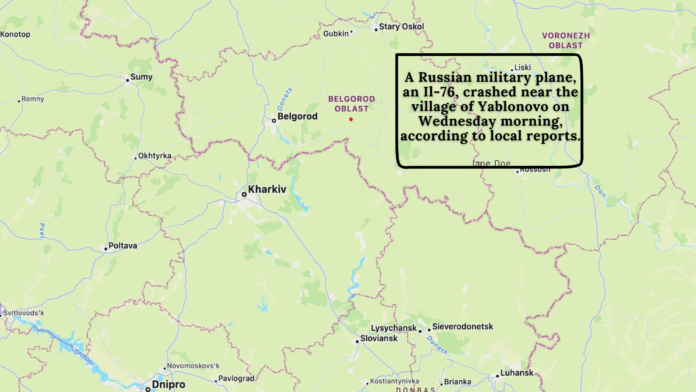Russian Military Plane Crash
In a tragic incident near the Ukraine border, a Russian military transport aircraft crashed in the Belgorod region on Wednesday, claiming the lives of all 74 individuals on board. The circumstances surrounding the crash remain unclear, with conflicting reports suggesting it could be a result of a missile strike or a catastrophic technical failure.
Russian authorities contend that Ukrainian missiles are to blame, alleging they killed 65 Russian prisoners of war, along with six crew members and three Russian personnel. Ukraine’s military command refrained from confirming firing at the Russian transport plane but regarded such aircraft approaching Belgorod as legitimate targets.
Russian Military Plane Crash

The distance between the alleged missile launch site in Liptsy, Ukraine, and the crash site raises questions about the feasibility of Ukrainian ground-to-air missile systems reaching the target. Speculation abounds regarding whether Ukrainians were aware of the aircraft’s route and timing for the alleged prisoner exchange, adding complexity to the unfolding situation.
Beyond the tragedy itself, the incident has introduced political dimensions and lingering uncertainties. Andrey Kartapolov of the Duma Defense Committee implicates US-made Patriot or German-made IRIS-T systems, insinuating foreign involvement in the attack without providing evidence. This raises concerns about a potential deviation from Ukraine’s commitment not to use foreign-donated weapons against Russian territory.
Reports of heightened Russian missile defences and the downing of a Ukrainian drone before the crash add to the enigma. The number of Russian personnel guarding the Ukrainian prisoners aboard the plane also raises eyebrows, with conflicting accounts from a former Ukrainian prisoner emphasizing a more substantial security presence during similar transports.
Russian Military Plane Crash Site

As the situation unfolds, the incident adds another layer to the ongoing information war in the conflict, with both sides presenting contrasting narratives. Dmytro Lubinets, Ukraine’s human rights ombudsman, emphasizes the importance of information warfare in destabilizing societies, reflecting the intricate tactics employed by both Russia and Ukraine.
The incident serves as a reminder of the complex dynamics at play in the region, where geopolitical tensions intertwine with military strategies. The possibility of unintended consequences looms large, emphasizing the need for thorough investigations to discern the truth behind this devastating event.
